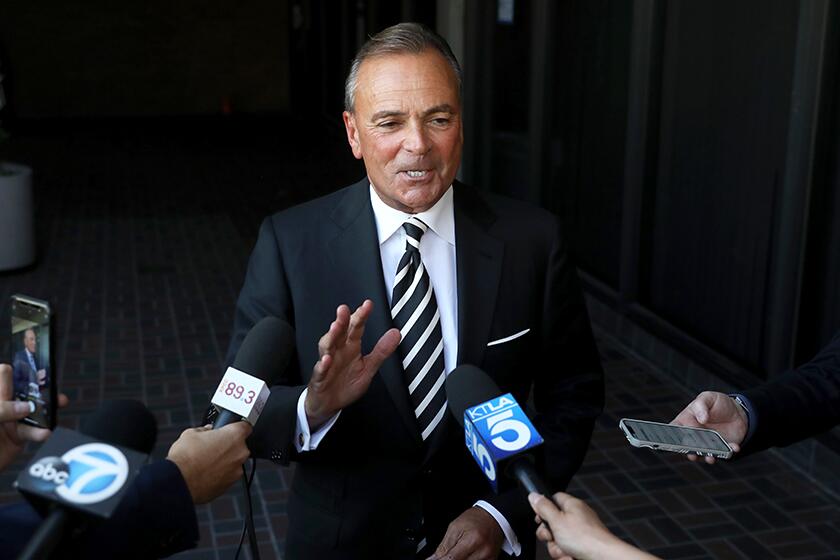Assembly OKs Prison in Graffiti Cases
- Share via
SACRAMENTO — By a wide margin, the Assembly on Friday passed a Republican measure that could mean a new risk for graffiti taggers--a trip to state prison.
The bill (AB 2331) by Assemblyman Jan Goldsmith (R-Poway) seeks to elevate graffiti offenses from misdemeanors to possible felonies, depending on the prosecutor’s decision or the degree of property damage.
Harsher treatment is justified, Goldsmith said, because current misdemeanor penalties have failed to discourage the spread of graffiti, which he called a brazen “in-your-face to the community, showing no respect for law and order.”
Needing 41 lower house votes, the measure easily passed, 53 to 15, and moved to the state Senate, where prospects were uncertain. A spokesman for Senate leader Bill Lockyer (D-Hayward) said, “There might be some Democratic votes,” giving the bill a chance for passage.
A spokesman for Gov. Pete Wilson said the governor is likely to support the measure, since he has been signing bills to increase graffiti penalties since 1991.
The Assembly also passed bills limiting liability of cities for skate-boarding injuries and seeking to cut down on the number of “frivolous” lawsuits by prison inmates.
Under the graffiti measure, taggers who deface public or private property resulting in cleanup costs of $400 or more could receive felony sentences of 16 months to three years.
An analysis by an Assembly committee concluded that, while numbers are unknown, enactment of the Goldsmith measure “would no doubt result in new admissions to state prisons.”
Currently, a felony conviction for a graffiti offense is possible but only when damage amounts to $5,000 or more, which supporters of the Goldsmith bill said has proved difficult to establish, even for repeat offenders.
Tip Kindel, a spokesman for the state Department of Corrections, said that at present “it would be extremely rare, if [possible] at all” to locate an inmate in the state prison system who was there solely because of a graffiti violation.
The bill’s potential impact on Los Angeles was not immediately known.
Spokesmen for Dist. Atty. Gil Garcetti and City Atty. James K. Hahn said figures on misdemeanor vandalism convictions did not contain a specific category for graffiti. A multi-agency anti-graffiti task force headed by the California Highway Patrol in Glendale could not immediately track down information on the number of known offenders, according to a spokesman.
In Sacramento, a lobbyist for the California District Attorneys Assn. said the group remained neutral on the Goldsmith bill.
Aides to Goldsmith said the $400 figure for an optional felony prosecution was decided on because it is consistent with the amount at which property theft becomes a felony.
Assemblyman John Burton of San Francisco, who joined 14 other Democrats in voting against the bill, said Los Angeles would be better off with “700 gangs that do nothing but spread graffiti than [with] three drive-by shooting gangs.”
But, said Goldsmith, his goal was to stop graffiti taggers “before they graduate to drive-by gangs.”
Besides the stiffer penalties, the measure would require courts to suspend driver’s licenses of graffiti offenders for one year, replacing current law that gives judges the option of imposing that sanction.
Meanwhile in related action, the Senate Appropriations Committee killed an anti-graffiti bill that would have outlawed cans of spray paint in Southern California unless they could be activated by a fixed power source, thus making them hard to carry. The bill by Sen. Quentin Kopp (I-San Francisco) was opposed by the paint industry.
The costs of graffiti cleanup have been estimated at $7 billion a year nationally, $500 million in California and approaching $100 million in Los Angeles County.
In other action Friday, the Assembly approved, 53 to 14, a bill by Bill Morrow (R-Oceanside) that would exempt government from liability when skateboarders are injured on public property. Governments and their employees should not have to answer to lawsuits when skateboarders or spectators suffer injuries when they “knew or should have known” of the danger, Morrow said.
Morrow tried to make his point by circulating to fellow Assembly members copies of Thrasher, a skateboarders’ magazine, showing youths performing daredevil moves on their boards. But, although his bill passed, the message was quickly lost when members discovered pictures of naked party-goers and a skateboard maker’s ad featuring obscene words in bold print.
What the Assembly should be alert to, said Assemblywoman Jackie Speier (D-Burlingame), was the extent to which the magazine found its way into the hands of children.
Also Friday, the Assembly passed, 52 to 12, a bill that seeks to reduce the number of lawsuits filed by state prison inmates. The legislation, also by Goldsmith, would require the approval of a judge before the suit is filed and calls for increasing filing fees from $3 to $180 except in hardship cases. Goldsmith said most of the court claims made by prisoners, estimated at 1,155 this year, are frivolous.
Assemblywoman Denise Ducheny (D-San Diego) disagreed, saying most inmate lawsuits seek remedies to personal and family problems rather than merely trying to make life easier behind bars.
Times staff writer Carl Ingram contributed to this story.
More to Read
Sign up for Essential California
The most important California stories and recommendations in your inbox every morning.
You may occasionally receive promotional content from the Los Angeles Times.










